Report: Creative and Ethical Leadership in UK's Transport Sector
VerifiedAdded on 2022/12/27
|12
|4097
|36
Report
AI Summary
This report delves into the crucial role of creative and ethical leadership within the UK transport industry. It begins with an introduction highlighting the importance of these leadership styles in navigating the challenges of globalization, technological advancements, and competition. The report analyzes the UK transport industry, emphasizing government investments and its multifaceted nature, encompassing various networks and services. It underscores the significance of skills like customer service, IT literacy, and creative and ethical leadership. The research methodology includes a 360-degree feedback questionnaire for self-evaluation and appraisal, along with a literature review. The literature review explores the industry's structure, market trends, and the impact of events like Brexit and the COVID-19 pandemic. The report highlights the need for ethical and creative leaders to foster employee motivation, engagement, and innovation. It also examines the role of ethical leadership in creating a supportive work environment and driving transformational change within organizations, teams, and communities. The report further discusses key trends, including the growth of rail freight, technological advancements, and the rise of e-commerce, emphasizing the need for cost-effectiveness, efficiency, and adaptation to remain competitive. The report concludes by underscoring the significance of ethical leadership, which focuses on fairness, respect, and team building to achieve both individual and organizational goals.
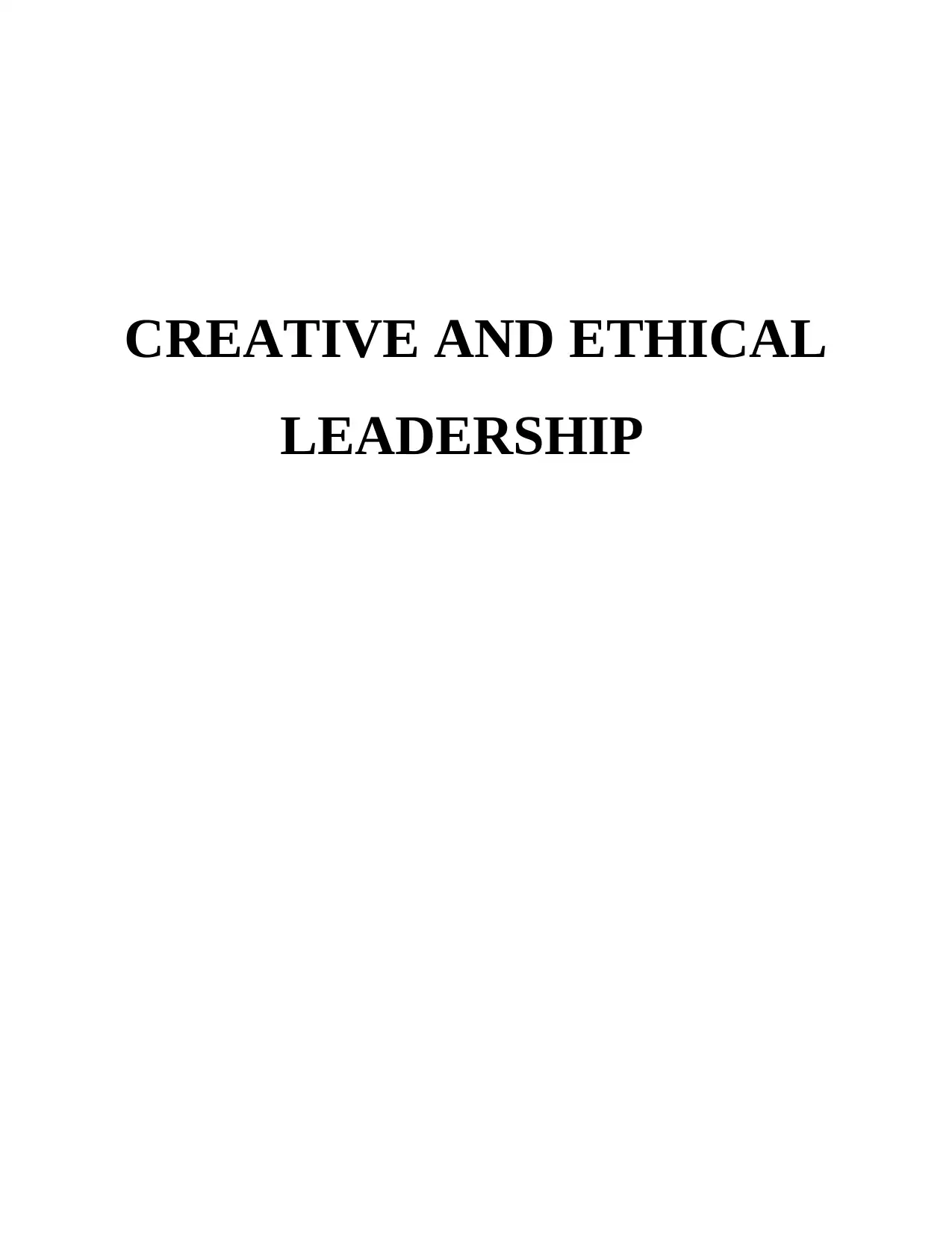
CREATIVE AND ETHICAL
LEADERSHIP
LEADERSHIP
Paraphrase This Document
Need a fresh take? Get an instant paraphrase of this document with our AI Paraphraser
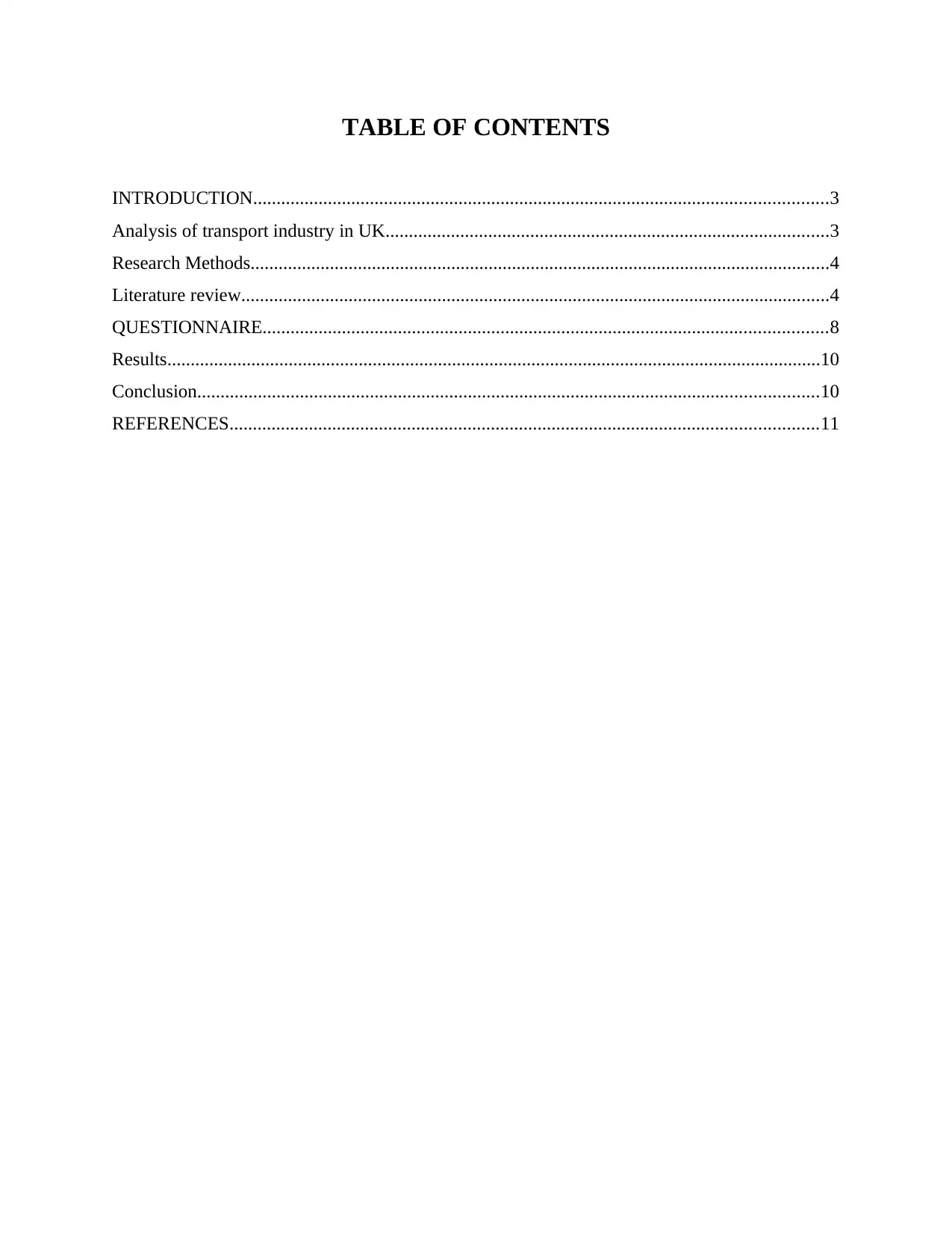
TABLE OF CONTENTS
INTRODUCTION...........................................................................................................................3
Analysis of transport industry in UK...............................................................................................3
Research Methods............................................................................................................................4
Literature review..............................................................................................................................4
QUESTIONNAIRE.........................................................................................................................8
Results............................................................................................................................................10
Conclusion.....................................................................................................................................10
REFERENCES..............................................................................................................................11
INTRODUCTION...........................................................................................................................3
Analysis of transport industry in UK...............................................................................................3
Research Methods............................................................................................................................4
Literature review..............................................................................................................................4
QUESTIONNAIRE.........................................................................................................................8
Results............................................................................................................................................10
Conclusion.....................................................................................................................................10
REFERENCES..............................................................................................................................11
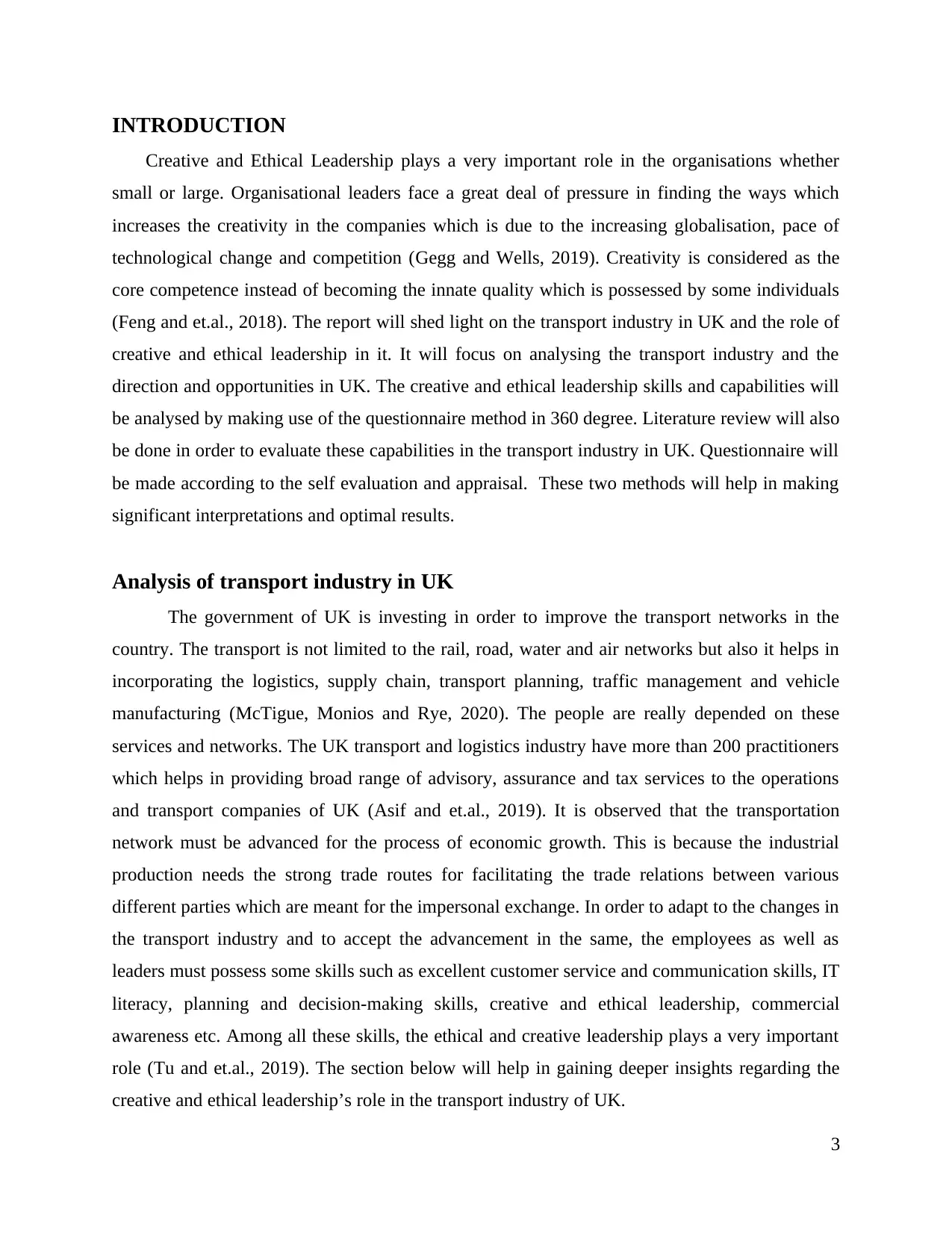
INTRODUCTION
Creative and Ethical Leadership plays a very important role in the organisations whether
small or large. Organisational leaders face a great deal of pressure in finding the ways which
increases the creativity in the companies which is due to the increasing globalisation, pace of
technological change and competition (Gegg and Wells, 2019). Creativity is considered as the
core competence instead of becoming the innate quality which is possessed by some individuals
(Feng and et.al., 2018). The report will shed light on the transport industry in UK and the role of
creative and ethical leadership in it. It will focus on analysing the transport industry and the
direction and opportunities in UK. The creative and ethical leadership skills and capabilities will
be analysed by making use of the questionnaire method in 360 degree. Literature review will also
be done in order to evaluate these capabilities in the transport industry in UK. Questionnaire will
be made according to the self evaluation and appraisal. These two methods will help in making
significant interpretations and optimal results.
Analysis of transport industry in UK
The government of UK is investing in order to improve the transport networks in the
country. The transport is not limited to the rail, road, water and air networks but also it helps in
incorporating the logistics, supply chain, transport planning, traffic management and vehicle
manufacturing (McTigue, Monios and Rye, 2020). The people are really depended on these
services and networks. The UK transport and logistics industry have more than 200 practitioners
which helps in providing broad range of advisory, assurance and tax services to the operations
and transport companies of UK (Asif and et.al., 2019). It is observed that the transportation
network must be advanced for the process of economic growth. This is because the industrial
production needs the strong trade routes for facilitating the trade relations between various
different parties which are meant for the impersonal exchange. In order to adapt to the changes in
the transport industry and to accept the advancement in the same, the employees as well as
leaders must possess some skills such as excellent customer service and communication skills, IT
literacy, planning and decision-making skills, creative and ethical leadership, commercial
awareness etc. Among all these skills, the ethical and creative leadership plays a very important
role (Tu and et.al., 2019). The section below will help in gaining deeper insights regarding the
creative and ethical leadership’s role in the transport industry of UK.
3
Creative and Ethical Leadership plays a very important role in the organisations whether
small or large. Organisational leaders face a great deal of pressure in finding the ways which
increases the creativity in the companies which is due to the increasing globalisation, pace of
technological change and competition (Gegg and Wells, 2019). Creativity is considered as the
core competence instead of becoming the innate quality which is possessed by some individuals
(Feng and et.al., 2018). The report will shed light on the transport industry in UK and the role of
creative and ethical leadership in it. It will focus on analysing the transport industry and the
direction and opportunities in UK. The creative and ethical leadership skills and capabilities will
be analysed by making use of the questionnaire method in 360 degree. Literature review will also
be done in order to evaluate these capabilities in the transport industry in UK. Questionnaire will
be made according to the self evaluation and appraisal. These two methods will help in making
significant interpretations and optimal results.
Analysis of transport industry in UK
The government of UK is investing in order to improve the transport networks in the
country. The transport is not limited to the rail, road, water and air networks but also it helps in
incorporating the logistics, supply chain, transport planning, traffic management and vehicle
manufacturing (McTigue, Monios and Rye, 2020). The people are really depended on these
services and networks. The UK transport and logistics industry have more than 200 practitioners
which helps in providing broad range of advisory, assurance and tax services to the operations
and transport companies of UK (Asif and et.al., 2019). It is observed that the transportation
network must be advanced for the process of economic growth. This is because the industrial
production needs the strong trade routes for facilitating the trade relations between various
different parties which are meant for the impersonal exchange. In order to adapt to the changes in
the transport industry and to accept the advancement in the same, the employees as well as
leaders must possess some skills such as excellent customer service and communication skills, IT
literacy, planning and decision-making skills, creative and ethical leadership, commercial
awareness etc. Among all these skills, the ethical and creative leadership plays a very important
role (Tu and et.al., 2019). The section below will help in gaining deeper insights regarding the
creative and ethical leadership’s role in the transport industry of UK.
3
⊘ This is a preview!⊘
Do you want full access?
Subscribe today to unlock all pages.

Trusted by 1+ million students worldwide
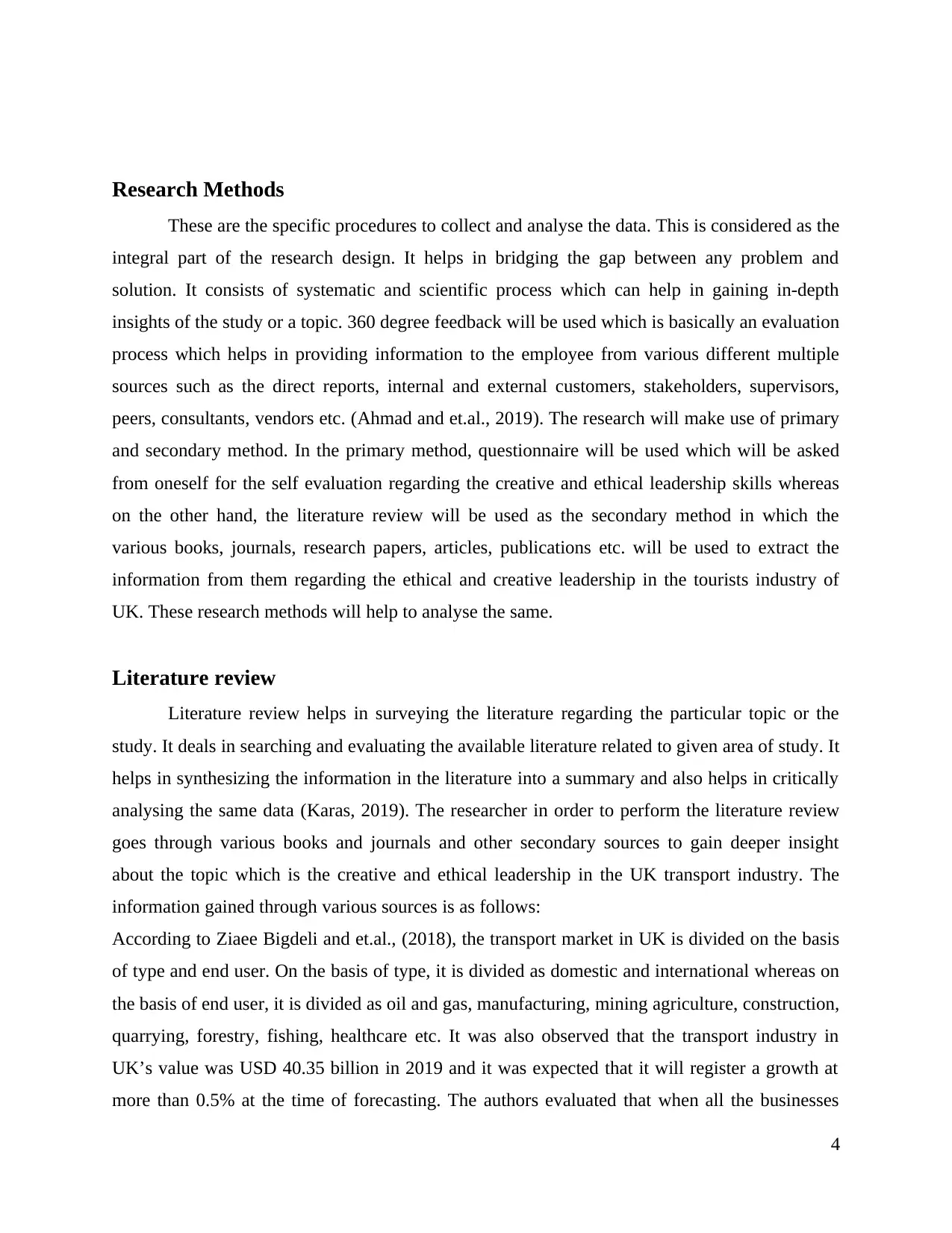
Research Methods
These are the specific procedures to collect and analyse the data. This is considered as the
integral part of the research design. It helps in bridging the gap between any problem and
solution. It consists of systematic and scientific process which can help in gaining in-depth
insights of the study or a topic. 360 degree feedback will be used which is basically an evaluation
process which helps in providing information to the employee from various different multiple
sources such as the direct reports, internal and external customers, stakeholders, supervisors,
peers, consultants, vendors etc. (Ahmad and et.al., 2019). The research will make use of primary
and secondary method. In the primary method, questionnaire will be used which will be asked
from oneself for the self evaluation regarding the creative and ethical leadership skills whereas
on the other hand, the literature review will be used as the secondary method in which the
various books, journals, research papers, articles, publications etc. will be used to extract the
information from them regarding the ethical and creative leadership in the tourists industry of
UK. These research methods will help to analyse the same.
Literature review
Literature review helps in surveying the literature regarding the particular topic or the
study. It deals in searching and evaluating the available literature related to given area of study. It
helps in synthesizing the information in the literature into a summary and also helps in critically
analysing the same data (Karas, 2019). The researcher in order to perform the literature review
goes through various books and journals and other secondary sources to gain deeper insight
about the topic which is the creative and ethical leadership in the UK transport industry. The
information gained through various sources is as follows:
According to Ziaee Bigdeli and et.al., (2018), the transport market in UK is divided on the basis
of type and end user. On the basis of type, it is divided as domestic and international whereas on
the basis of end user, it is divided as oil and gas, manufacturing, mining agriculture, construction,
quarrying, forestry, fishing, healthcare etc. It was also observed that the transport industry in
UK’s value was USD 40.35 billion in 2019 and it was expected that it will register a growth at
more than 0.5% at the time of forecasting. The authors evaluated that when all the businesses
4
These are the specific procedures to collect and analyse the data. This is considered as the
integral part of the research design. It helps in bridging the gap between any problem and
solution. It consists of systematic and scientific process which can help in gaining in-depth
insights of the study or a topic. 360 degree feedback will be used which is basically an evaluation
process which helps in providing information to the employee from various different multiple
sources such as the direct reports, internal and external customers, stakeholders, supervisors,
peers, consultants, vendors etc. (Ahmad and et.al., 2019). The research will make use of primary
and secondary method. In the primary method, questionnaire will be used which will be asked
from oneself for the self evaluation regarding the creative and ethical leadership skills whereas
on the other hand, the literature review will be used as the secondary method in which the
various books, journals, research papers, articles, publications etc. will be used to extract the
information from them regarding the ethical and creative leadership in the tourists industry of
UK. These research methods will help to analyse the same.
Literature review
Literature review helps in surveying the literature regarding the particular topic or the
study. It deals in searching and evaluating the available literature related to given area of study. It
helps in synthesizing the information in the literature into a summary and also helps in critically
analysing the same data (Karas, 2019). The researcher in order to perform the literature review
goes through various books and journals and other secondary sources to gain deeper insight
about the topic which is the creative and ethical leadership in the UK transport industry. The
information gained through various sources is as follows:
According to Ziaee Bigdeli and et.al., (2018), the transport market in UK is divided on the basis
of type and end user. On the basis of type, it is divided as domestic and international whereas on
the basis of end user, it is divided as oil and gas, manufacturing, mining agriculture, construction,
quarrying, forestry, fishing, healthcare etc. It was also observed that the transport industry in
UK’s value was USD 40.35 billion in 2019 and it was expected that it will register a growth at
more than 0.5% at the time of forecasting. The authors evaluated that when all the businesses
4
Paraphrase This Document
Need a fresh take? Get an instant paraphrase of this document with our AI Paraphraser
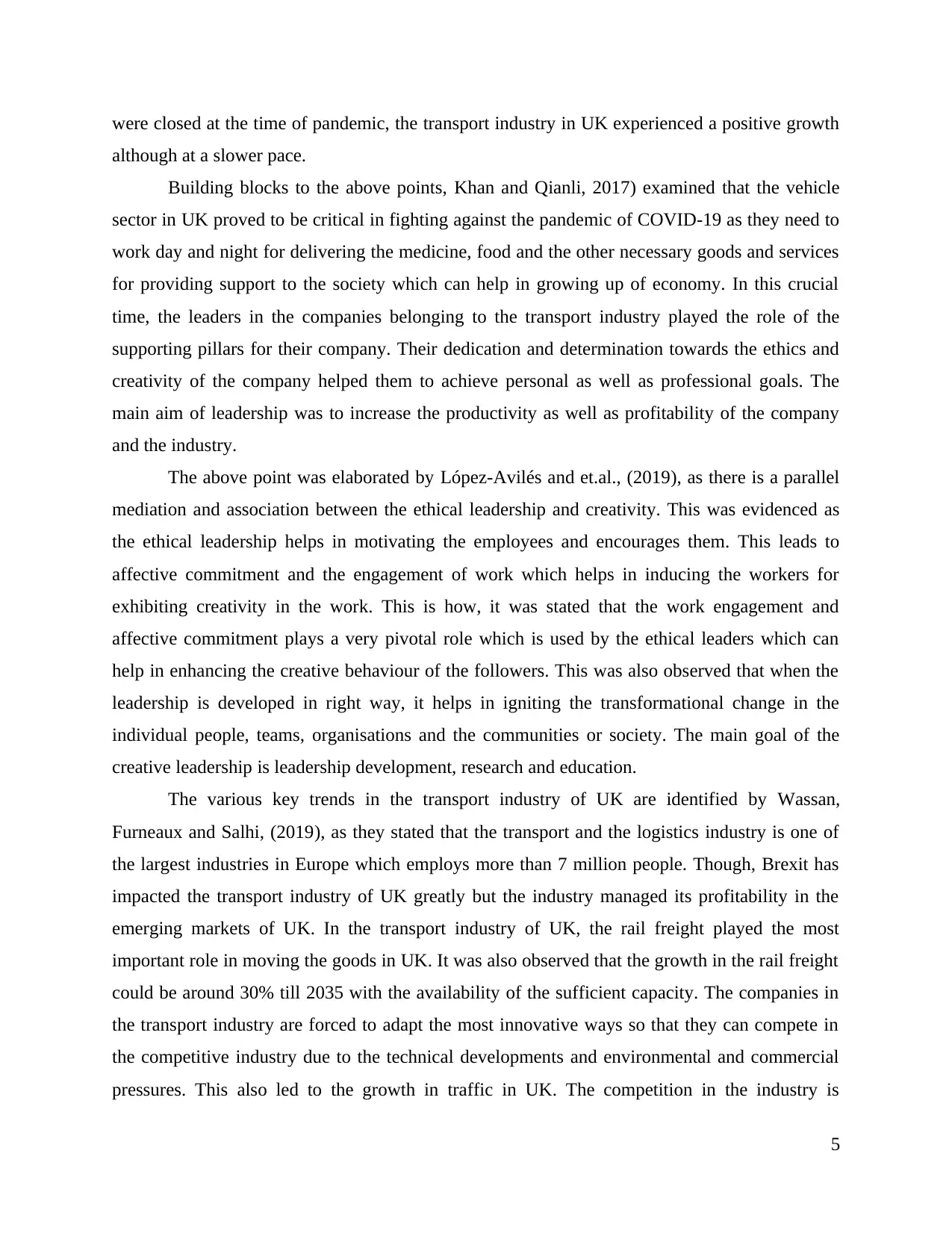
were closed at the time of pandemic, the transport industry in UK experienced a positive growth
although at a slower pace.
Building blocks to the above points, Khan and Qianli, 2017) examined that the vehicle
sector in UK proved to be critical in fighting against the pandemic of COVID-19 as they need to
work day and night for delivering the medicine, food and the other necessary goods and services
for providing support to the society which can help in growing up of economy. In this crucial
time, the leaders in the companies belonging to the transport industry played the role of the
supporting pillars for their company. Their dedication and determination towards the ethics and
creativity of the company helped them to achieve personal as well as professional goals. The
main aim of leadership was to increase the productivity as well as profitability of the company
and the industry.
The above point was elaborated by López-Avilés and et.al., (2019), as there is a parallel
mediation and association between the ethical leadership and creativity. This was evidenced as
the ethical leadership helps in motivating the employees and encourages them. This leads to
affective commitment and the engagement of work which helps in inducing the workers for
exhibiting creativity in the work. This is how, it was stated that the work engagement and
affective commitment plays a very pivotal role which is used by the ethical leaders which can
help in enhancing the creative behaviour of the followers. This was also observed that when the
leadership is developed in right way, it helps in igniting the transformational change in the
individual people, teams, organisations and the communities or society. The main goal of the
creative leadership is leadership development, research and education.
The various key trends in the transport industry of UK are identified by Wassan,
Furneaux and Salhi, (2019), as they stated that the transport and the logistics industry is one of
the largest industries in Europe which employs more than 7 million people. Though, Brexit has
impacted the transport industry of UK greatly but the industry managed its profitability in the
emerging markets of UK. In the transport industry of UK, the rail freight played the most
important role in moving the goods in UK. It was also observed that the growth in the rail freight
could be around 30% till 2035 with the availability of the sufficient capacity. The companies in
the transport industry are forced to adapt the most innovative ways so that they can compete in
the competitive industry due to the technical developments and environmental and commercial
pressures. This also led to the growth in traffic in UK. The competition in the industry is
5
although at a slower pace.
Building blocks to the above points, Khan and Qianli, 2017) examined that the vehicle
sector in UK proved to be critical in fighting against the pandemic of COVID-19 as they need to
work day and night for delivering the medicine, food and the other necessary goods and services
for providing support to the society which can help in growing up of economy. In this crucial
time, the leaders in the companies belonging to the transport industry played the role of the
supporting pillars for their company. Their dedication and determination towards the ethics and
creativity of the company helped them to achieve personal as well as professional goals. The
main aim of leadership was to increase the productivity as well as profitability of the company
and the industry.
The above point was elaborated by López-Avilés and et.al., (2019), as there is a parallel
mediation and association between the ethical leadership and creativity. This was evidenced as
the ethical leadership helps in motivating the employees and encourages them. This leads to
affective commitment and the engagement of work which helps in inducing the workers for
exhibiting creativity in the work. This is how, it was stated that the work engagement and
affective commitment plays a very pivotal role which is used by the ethical leaders which can
help in enhancing the creative behaviour of the followers. This was also observed that when the
leadership is developed in right way, it helps in igniting the transformational change in the
individual people, teams, organisations and the communities or society. The main goal of the
creative leadership is leadership development, research and education.
The various key trends in the transport industry of UK are identified by Wassan,
Furneaux and Salhi, (2019), as they stated that the transport and the logistics industry is one of
the largest industries in Europe which employs more than 7 million people. Though, Brexit has
impacted the transport industry of UK greatly but the industry managed its profitability in the
emerging markets of UK. In the transport industry of UK, the rail freight played the most
important role in moving the goods in UK. It was also observed that the growth in the rail freight
could be around 30% till 2035 with the availability of the sufficient capacity. The companies in
the transport industry are forced to adapt the most innovative ways so that they can compete in
the competitive industry due to the technical developments and environmental and commercial
pressures. This also led to the growth in traffic in UK. The competition in the industry is
5
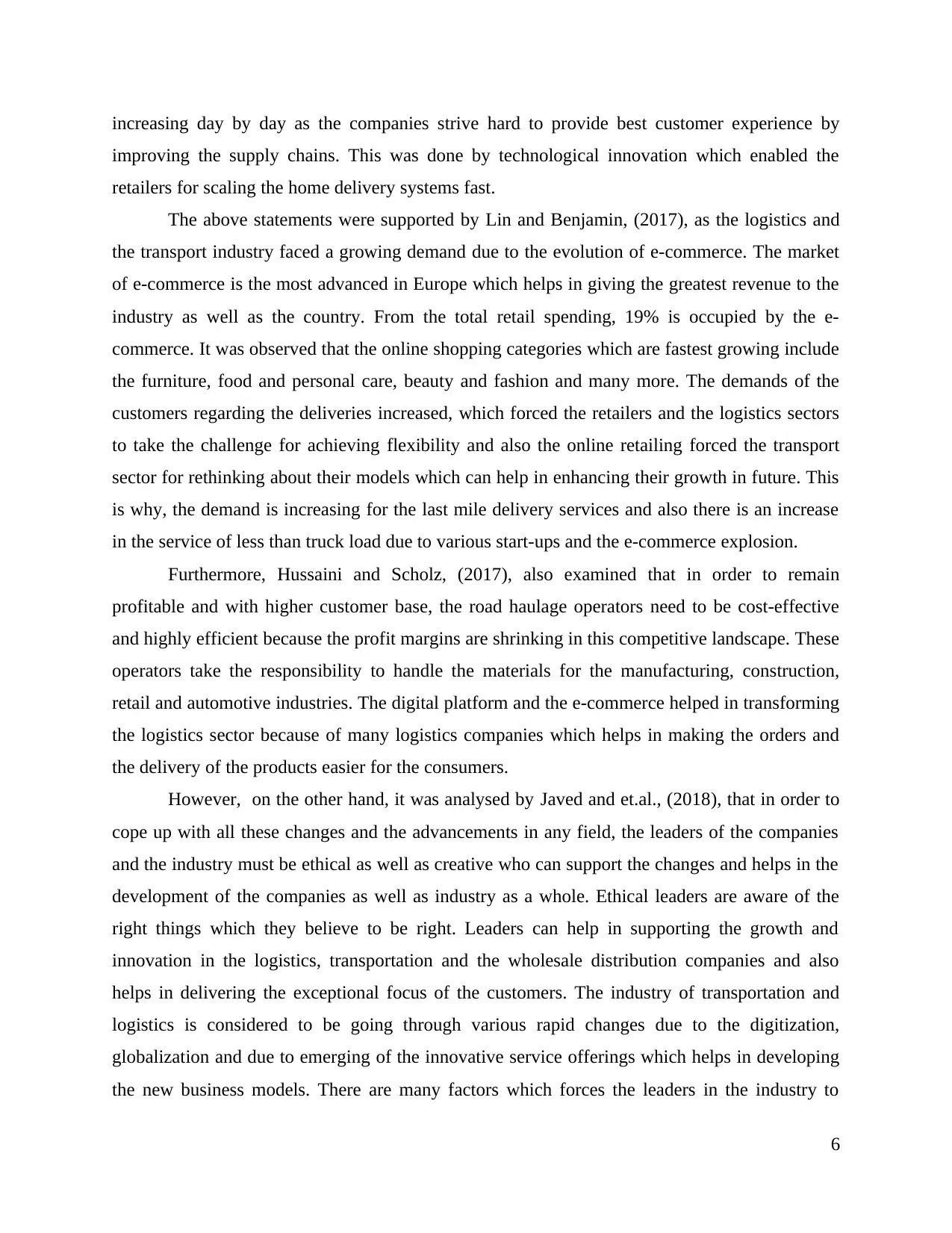
increasing day by day as the companies strive hard to provide best customer experience by
improving the supply chains. This was done by technological innovation which enabled the
retailers for scaling the home delivery systems fast.
The above statements were supported by Lin and Benjamin, (2017), as the logistics and
the transport industry faced a growing demand due to the evolution of e-commerce. The market
of e-commerce is the most advanced in Europe which helps in giving the greatest revenue to the
industry as well as the country. From the total retail spending, 19% is occupied by the e-
commerce. It was observed that the online shopping categories which are fastest growing include
the furniture, food and personal care, beauty and fashion and many more. The demands of the
customers regarding the deliveries increased, which forced the retailers and the logistics sectors
to take the challenge for achieving flexibility and also the online retailing forced the transport
sector for rethinking about their models which can help in enhancing their growth in future. This
is why, the demand is increasing for the last mile delivery services and also there is an increase
in the service of less than truck load due to various start-ups and the e-commerce explosion.
Furthermore, Hussaini and Scholz, (2017), also examined that in order to remain
profitable and with higher customer base, the road haulage operators need to be cost-effective
and highly efficient because the profit margins are shrinking in this competitive landscape. These
operators take the responsibility to handle the materials for the manufacturing, construction,
retail and automotive industries. The digital platform and the e-commerce helped in transforming
the logistics sector because of many logistics companies which helps in making the orders and
the delivery of the products easier for the consumers.
However, on the other hand, it was analysed by Javed and et.al., (2018), that in order to
cope up with all these changes and the advancements in any field, the leaders of the companies
and the industry must be ethical as well as creative who can support the changes and helps in the
development of the companies as well as industry as a whole. Ethical leaders are aware of the
right things which they believe to be right. Leaders can help in supporting the growth and
innovation in the logistics, transportation and the wholesale distribution companies and also
helps in delivering the exceptional focus of the customers. The industry of transportation and
logistics is considered to be going through various rapid changes due to the digitization,
globalization and due to emerging of the innovative service offerings which helps in developing
the new business models. There are many factors which forces the leaders in the industry to
6
improving the supply chains. This was done by technological innovation which enabled the
retailers for scaling the home delivery systems fast.
The above statements were supported by Lin and Benjamin, (2017), as the logistics and
the transport industry faced a growing demand due to the evolution of e-commerce. The market
of e-commerce is the most advanced in Europe which helps in giving the greatest revenue to the
industry as well as the country. From the total retail spending, 19% is occupied by the e-
commerce. It was observed that the online shopping categories which are fastest growing include
the furniture, food and personal care, beauty and fashion and many more. The demands of the
customers regarding the deliveries increased, which forced the retailers and the logistics sectors
to take the challenge for achieving flexibility and also the online retailing forced the transport
sector for rethinking about their models which can help in enhancing their growth in future. This
is why, the demand is increasing for the last mile delivery services and also there is an increase
in the service of less than truck load due to various start-ups and the e-commerce explosion.
Furthermore, Hussaini and Scholz, (2017), also examined that in order to remain
profitable and with higher customer base, the road haulage operators need to be cost-effective
and highly efficient because the profit margins are shrinking in this competitive landscape. These
operators take the responsibility to handle the materials for the manufacturing, construction,
retail and automotive industries. The digital platform and the e-commerce helped in transforming
the logistics sector because of many logistics companies which helps in making the orders and
the delivery of the products easier for the consumers.
However, on the other hand, it was analysed by Javed and et.al., (2018), that in order to
cope up with all these changes and the advancements in any field, the leaders of the companies
and the industry must be ethical as well as creative who can support the changes and helps in the
development of the companies as well as industry as a whole. Ethical leaders are aware of the
right things which they believe to be right. Leaders can help in supporting the growth and
innovation in the logistics, transportation and the wholesale distribution companies and also
helps in delivering the exceptional focus of the customers. The industry of transportation and
logistics is considered to be going through various rapid changes due to the digitization,
globalization and due to emerging of the innovative service offerings which helps in developing
the new business models. There are many factors which forces the leaders in the industry to
6
⊘ This is a preview!⊘
Do you want full access?
Subscribe today to unlock all pages.

Trusted by 1+ million students worldwide
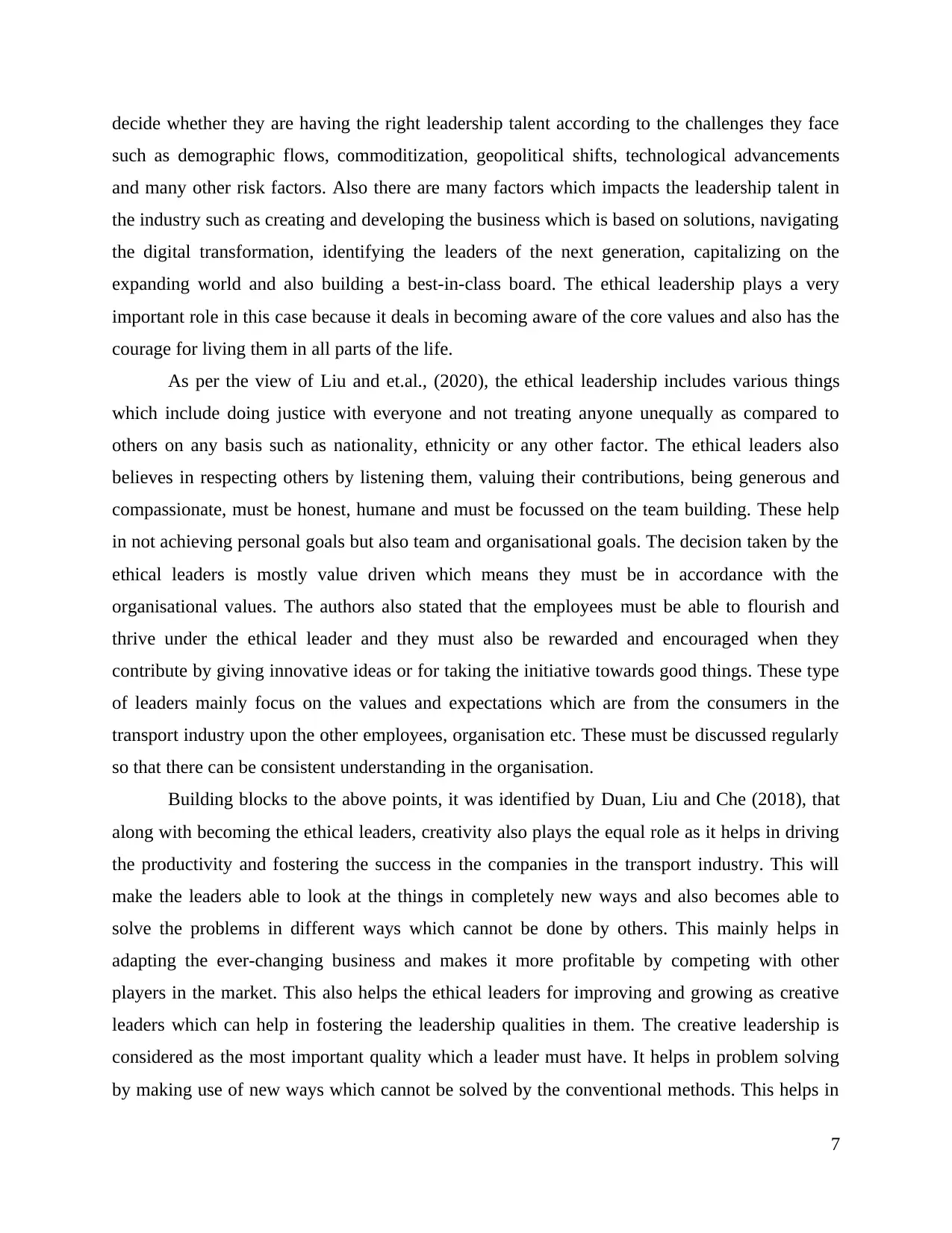
decide whether they are having the right leadership talent according to the challenges they face
such as demographic flows, commoditization, geopolitical shifts, technological advancements
and many other risk factors. Also there are many factors which impacts the leadership talent in
the industry such as creating and developing the business which is based on solutions, navigating
the digital transformation, identifying the leaders of the next generation, capitalizing on the
expanding world and also building a best-in-class board. The ethical leadership plays a very
important role in this case because it deals in becoming aware of the core values and also has the
courage for living them in all parts of the life.
As per the view of Liu and et.al., (2020), the ethical leadership includes various things
which include doing justice with everyone and not treating anyone unequally as compared to
others on any basis such as nationality, ethnicity or any other factor. The ethical leaders also
believes in respecting others by listening them, valuing their contributions, being generous and
compassionate, must be honest, humane and must be focussed on the team building. These help
in not achieving personal goals but also team and organisational goals. The decision taken by the
ethical leaders is mostly value driven which means they must be in accordance with the
organisational values. The authors also stated that the employees must be able to flourish and
thrive under the ethical leader and they must also be rewarded and encouraged when they
contribute by giving innovative ideas or for taking the initiative towards good things. These type
of leaders mainly focus on the values and expectations which are from the consumers in the
transport industry upon the other employees, organisation etc. These must be discussed regularly
so that there can be consistent understanding in the organisation.
Building blocks to the above points, it was identified by Duan, Liu and Che (2018), that
along with becoming the ethical leaders, creativity also plays the equal role as it helps in driving
the productivity and fostering the success in the companies in the transport industry. This will
make the leaders able to look at the things in completely new ways and also becomes able to
solve the problems in different ways which cannot be done by others. This mainly helps in
adapting the ever-changing business and makes it more profitable by competing with other
players in the market. This also helps the ethical leaders for improving and growing as creative
leaders which can help in fostering the leadership qualities in them. The creative leadership is
considered as the most important quality which a leader must have. It helps in problem solving
by making use of new ways which cannot be solved by the conventional methods. This helps in
7
such as demographic flows, commoditization, geopolitical shifts, technological advancements
and many other risk factors. Also there are many factors which impacts the leadership talent in
the industry such as creating and developing the business which is based on solutions, navigating
the digital transformation, identifying the leaders of the next generation, capitalizing on the
expanding world and also building a best-in-class board. The ethical leadership plays a very
important role in this case because it deals in becoming aware of the core values and also has the
courage for living them in all parts of the life.
As per the view of Liu and et.al., (2020), the ethical leadership includes various things
which include doing justice with everyone and not treating anyone unequally as compared to
others on any basis such as nationality, ethnicity or any other factor. The ethical leaders also
believes in respecting others by listening them, valuing their contributions, being generous and
compassionate, must be honest, humane and must be focussed on the team building. These help
in not achieving personal goals but also team and organisational goals. The decision taken by the
ethical leaders is mostly value driven which means they must be in accordance with the
organisational values. The authors also stated that the employees must be able to flourish and
thrive under the ethical leader and they must also be rewarded and encouraged when they
contribute by giving innovative ideas or for taking the initiative towards good things. These type
of leaders mainly focus on the values and expectations which are from the consumers in the
transport industry upon the other employees, organisation etc. These must be discussed regularly
so that there can be consistent understanding in the organisation.
Building blocks to the above points, it was identified by Duan, Liu and Che (2018), that
along with becoming the ethical leaders, creativity also plays the equal role as it helps in driving
the productivity and fostering the success in the companies in the transport industry. This will
make the leaders able to look at the things in completely new ways and also becomes able to
solve the problems in different ways which cannot be done by others. This mainly helps in
adapting the ever-changing business and makes it more profitable by competing with other
players in the market. This also helps the ethical leaders for improving and growing as creative
leaders which can help in fostering the leadership qualities in them. The creative leadership is
considered as the most important quality which a leader must have. It helps in problem solving
by making use of new ways which cannot be solved by the conventional methods. This helps in
7
Paraphrase This Document
Need a fresh take? Get an instant paraphrase of this document with our AI Paraphraser
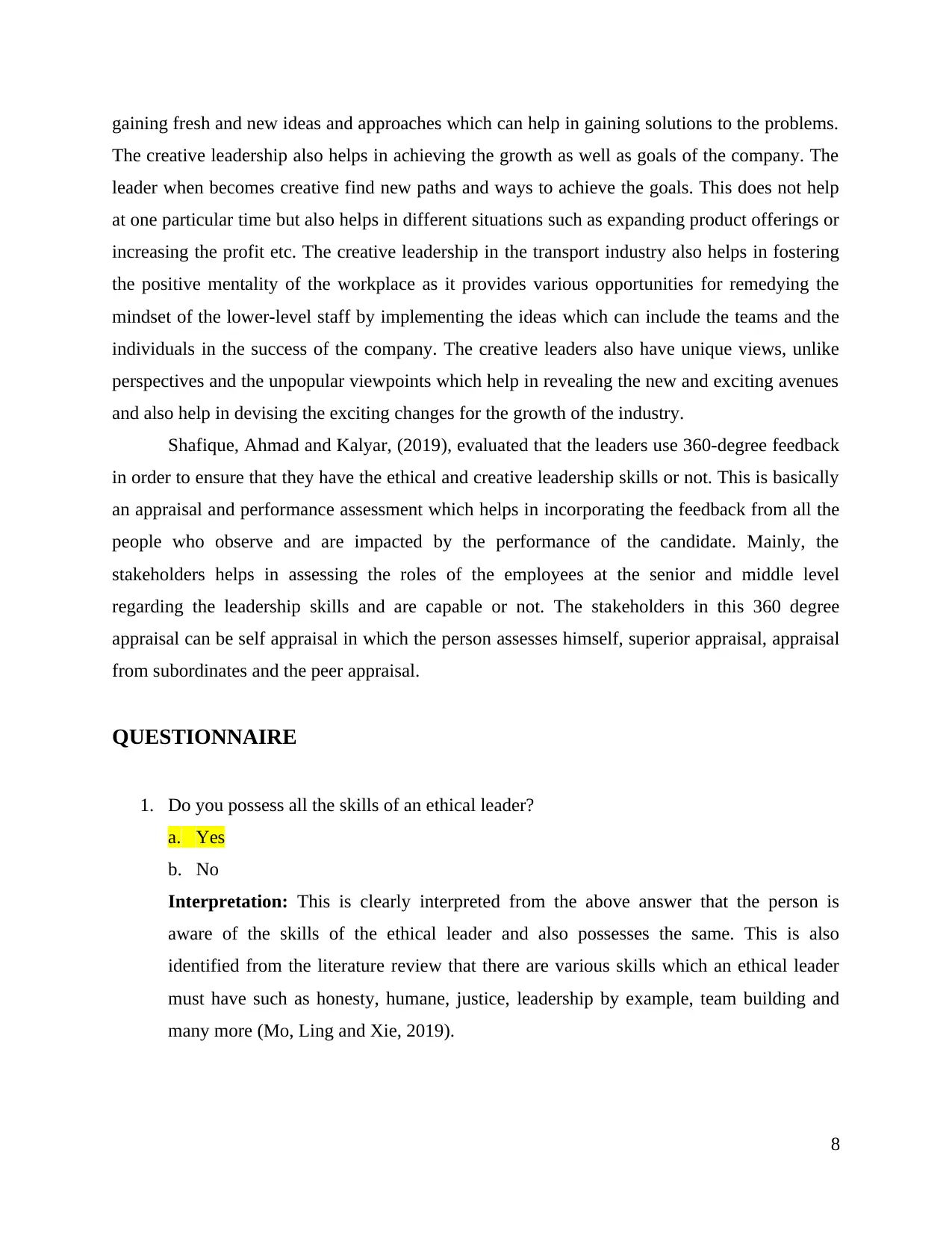
gaining fresh and new ideas and approaches which can help in gaining solutions to the problems.
The creative leadership also helps in achieving the growth as well as goals of the company. The
leader when becomes creative find new paths and ways to achieve the goals. This does not help
at one particular time but also helps in different situations such as expanding product offerings or
increasing the profit etc. The creative leadership in the transport industry also helps in fostering
the positive mentality of the workplace as it provides various opportunities for remedying the
mindset of the lower-level staff by implementing the ideas which can include the teams and the
individuals in the success of the company. The creative leaders also have unique views, unlike
perspectives and the unpopular viewpoints which help in revealing the new and exciting avenues
and also help in devising the exciting changes for the growth of the industry.
Shafique, Ahmad and Kalyar, (2019), evaluated that the leaders use 360-degree feedback
in order to ensure that they have the ethical and creative leadership skills or not. This is basically
an appraisal and performance assessment which helps in incorporating the feedback from all the
people who observe and are impacted by the performance of the candidate. Mainly, the
stakeholders helps in assessing the roles of the employees at the senior and middle level
regarding the leadership skills and are capable or not. The stakeholders in this 360 degree
appraisal can be self appraisal in which the person assesses himself, superior appraisal, appraisal
from subordinates and the peer appraisal.
QUESTIONNAIRE
1. Do you possess all the skills of an ethical leader?
a. Yes
b. No
Interpretation: This is clearly interpreted from the above answer that the person is
aware of the skills of the ethical leader and also possesses the same. This is also
identified from the literature review that there are various skills which an ethical leader
must have such as honesty, humane, justice, leadership by example, team building and
many more (Mo, Ling and Xie, 2019).
8
The creative leadership also helps in achieving the growth as well as goals of the company. The
leader when becomes creative find new paths and ways to achieve the goals. This does not help
at one particular time but also helps in different situations such as expanding product offerings or
increasing the profit etc. The creative leadership in the transport industry also helps in fostering
the positive mentality of the workplace as it provides various opportunities for remedying the
mindset of the lower-level staff by implementing the ideas which can include the teams and the
individuals in the success of the company. The creative leaders also have unique views, unlike
perspectives and the unpopular viewpoints which help in revealing the new and exciting avenues
and also help in devising the exciting changes for the growth of the industry.
Shafique, Ahmad and Kalyar, (2019), evaluated that the leaders use 360-degree feedback
in order to ensure that they have the ethical and creative leadership skills or not. This is basically
an appraisal and performance assessment which helps in incorporating the feedback from all the
people who observe and are impacted by the performance of the candidate. Mainly, the
stakeholders helps in assessing the roles of the employees at the senior and middle level
regarding the leadership skills and are capable or not. The stakeholders in this 360 degree
appraisal can be self appraisal in which the person assesses himself, superior appraisal, appraisal
from subordinates and the peer appraisal.
QUESTIONNAIRE
1. Do you possess all the skills of an ethical leader?
a. Yes
b. No
Interpretation: This is clearly interpreted from the above answer that the person is
aware of the skills of the ethical leader and also possesses the same. This is also
identified from the literature review that there are various skills which an ethical leader
must have such as honesty, humane, justice, leadership by example, team building and
many more (Mo, Ling and Xie, 2019).
8
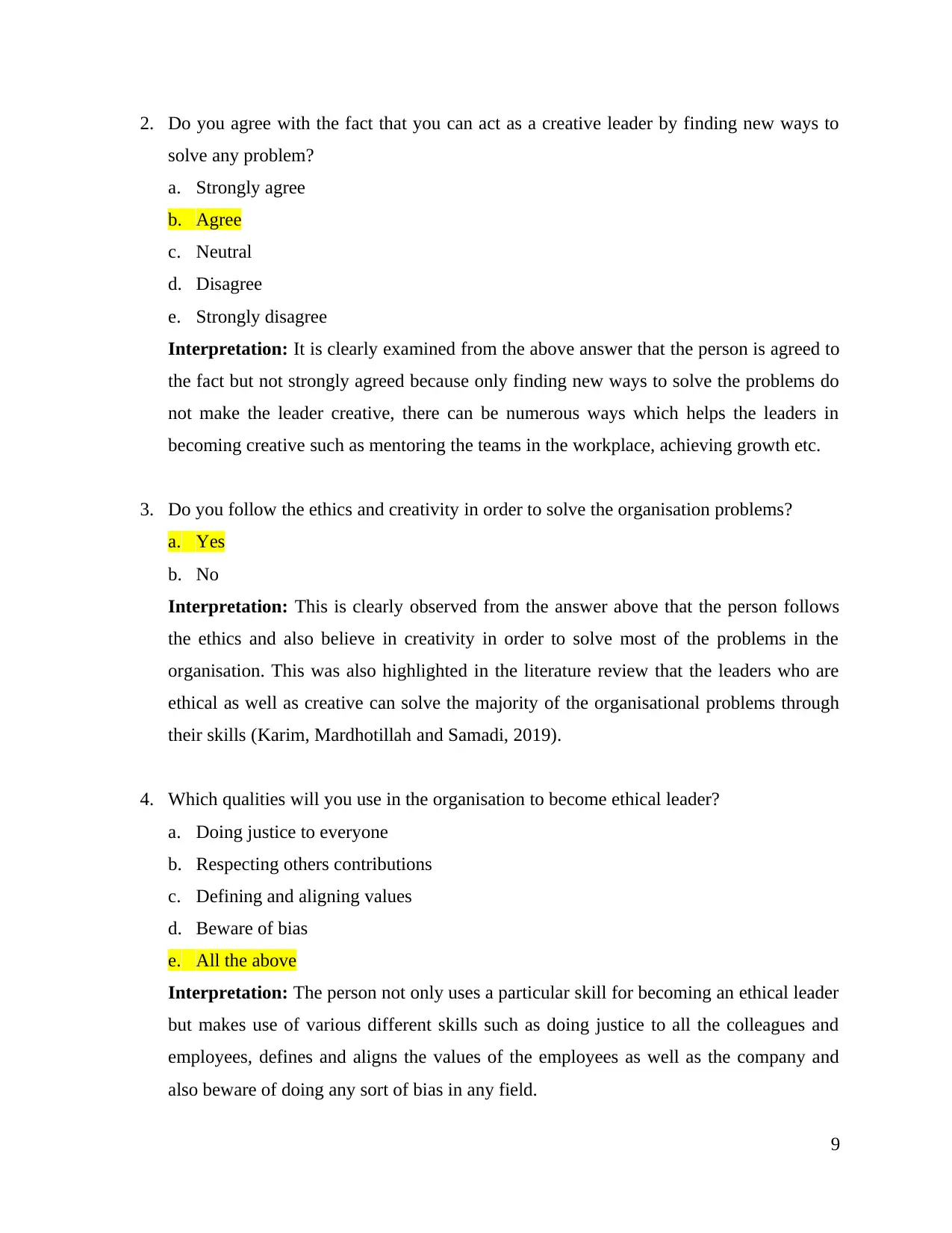
2. Do you agree with the fact that you can act as a creative leader by finding new ways to
solve any problem?
a. Strongly agree
b. Agree
c. Neutral
d. Disagree
e. Strongly disagree
Interpretation: It is clearly examined from the above answer that the person is agreed to
the fact but not strongly agreed because only finding new ways to solve the problems do
not make the leader creative, there can be numerous ways which helps the leaders in
becoming creative such as mentoring the teams in the workplace, achieving growth etc.
3. Do you follow the ethics and creativity in order to solve the organisation problems?
a. Yes
b. No
Interpretation: This is clearly observed from the answer above that the person follows
the ethics and also believe in creativity in order to solve most of the problems in the
organisation. This was also highlighted in the literature review that the leaders who are
ethical as well as creative can solve the majority of the organisational problems through
their skills (Karim, Mardhotillah and Samadi, 2019).
4. Which qualities will you use in the organisation to become ethical leader?
a. Doing justice to everyone
b. Respecting others contributions
c. Defining and aligning values
d. Beware of bias
e. All the above
Interpretation: The person not only uses a particular skill for becoming an ethical leader
but makes use of various different skills such as doing justice to all the colleagues and
employees, defines and aligns the values of the employees as well as the company and
also beware of doing any sort of bias in any field.
9
solve any problem?
a. Strongly agree
b. Agree
c. Neutral
d. Disagree
e. Strongly disagree
Interpretation: It is clearly examined from the above answer that the person is agreed to
the fact but not strongly agreed because only finding new ways to solve the problems do
not make the leader creative, there can be numerous ways which helps the leaders in
becoming creative such as mentoring the teams in the workplace, achieving growth etc.
3. Do you follow the ethics and creativity in order to solve the organisation problems?
a. Yes
b. No
Interpretation: This is clearly observed from the answer above that the person follows
the ethics and also believe in creativity in order to solve most of the problems in the
organisation. This was also highlighted in the literature review that the leaders who are
ethical as well as creative can solve the majority of the organisational problems through
their skills (Karim, Mardhotillah and Samadi, 2019).
4. Which qualities will you use in the organisation to become ethical leader?
a. Doing justice to everyone
b. Respecting others contributions
c. Defining and aligning values
d. Beware of bias
e. All the above
Interpretation: The person not only uses a particular skill for becoming an ethical leader
but makes use of various different skills such as doing justice to all the colleagues and
employees, defines and aligns the values of the employees as well as the company and
also beware of doing any sort of bias in any field.
9
⊘ This is a preview!⊘
Do you want full access?
Subscribe today to unlock all pages.

Trusted by 1+ million students worldwide
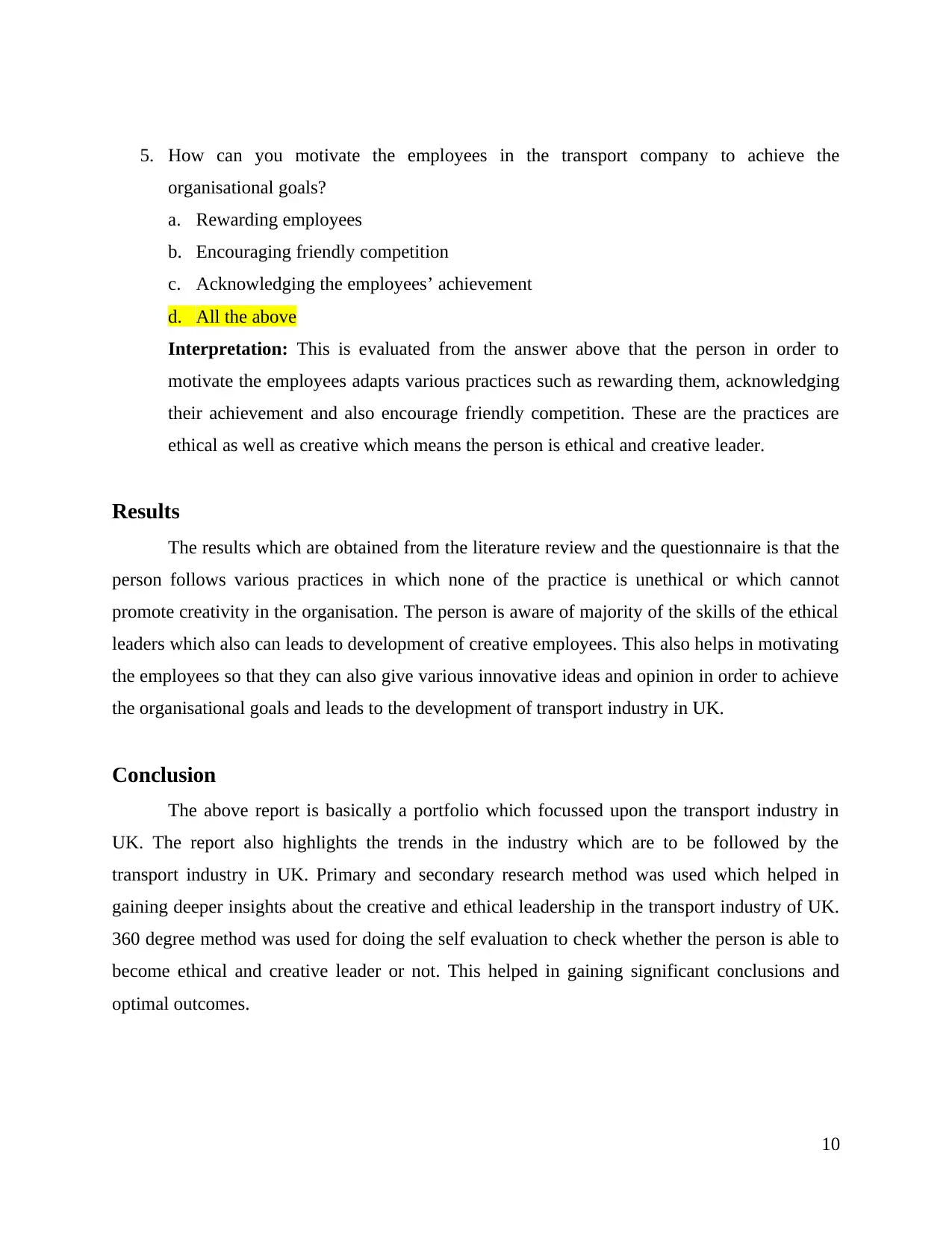
5. How can you motivate the employees in the transport company to achieve the
organisational goals?
a. Rewarding employees
b. Encouraging friendly competition
c. Acknowledging the employees’ achievement
d. All the above
Interpretation: This is evaluated from the answer above that the person in order to
motivate the employees adapts various practices such as rewarding them, acknowledging
their achievement and also encourage friendly competition. These are the practices are
ethical as well as creative which means the person is ethical and creative leader.
Results
The results which are obtained from the literature review and the questionnaire is that the
person follows various practices in which none of the practice is unethical or which cannot
promote creativity in the organisation. The person is aware of majority of the skills of the ethical
leaders which also can leads to development of creative employees. This also helps in motivating
the employees so that they can also give various innovative ideas and opinion in order to achieve
the organisational goals and leads to the development of transport industry in UK.
Conclusion
The above report is basically a portfolio which focussed upon the transport industry in
UK. The report also highlights the trends in the industry which are to be followed by the
transport industry in UK. Primary and secondary research method was used which helped in
gaining deeper insights about the creative and ethical leadership in the transport industry of UK.
360 degree method was used for doing the self evaluation to check whether the person is able to
become ethical and creative leader or not. This helped in gaining significant conclusions and
optimal outcomes.
10
organisational goals?
a. Rewarding employees
b. Encouraging friendly competition
c. Acknowledging the employees’ achievement
d. All the above
Interpretation: This is evaluated from the answer above that the person in order to
motivate the employees adapts various practices such as rewarding them, acknowledging
their achievement and also encourage friendly competition. These are the practices are
ethical as well as creative which means the person is ethical and creative leader.
Results
The results which are obtained from the literature review and the questionnaire is that the
person follows various practices in which none of the practice is unethical or which cannot
promote creativity in the organisation. The person is aware of majority of the skills of the ethical
leaders which also can leads to development of creative employees. This also helps in motivating
the employees so that they can also give various innovative ideas and opinion in order to achieve
the organisational goals and leads to the development of transport industry in UK.
Conclusion
The above report is basically a portfolio which focussed upon the transport industry in
UK. The report also highlights the trends in the industry which are to be followed by the
transport industry in UK. Primary and secondary research method was used which helped in
gaining deeper insights about the creative and ethical leadership in the transport industry of UK.
360 degree method was used for doing the self evaluation to check whether the person is able to
become ethical and creative leader or not. This helped in gaining significant conclusions and
optimal outcomes.
10
Paraphrase This Document
Need a fresh take? Get an instant paraphrase of this document with our AI Paraphraser
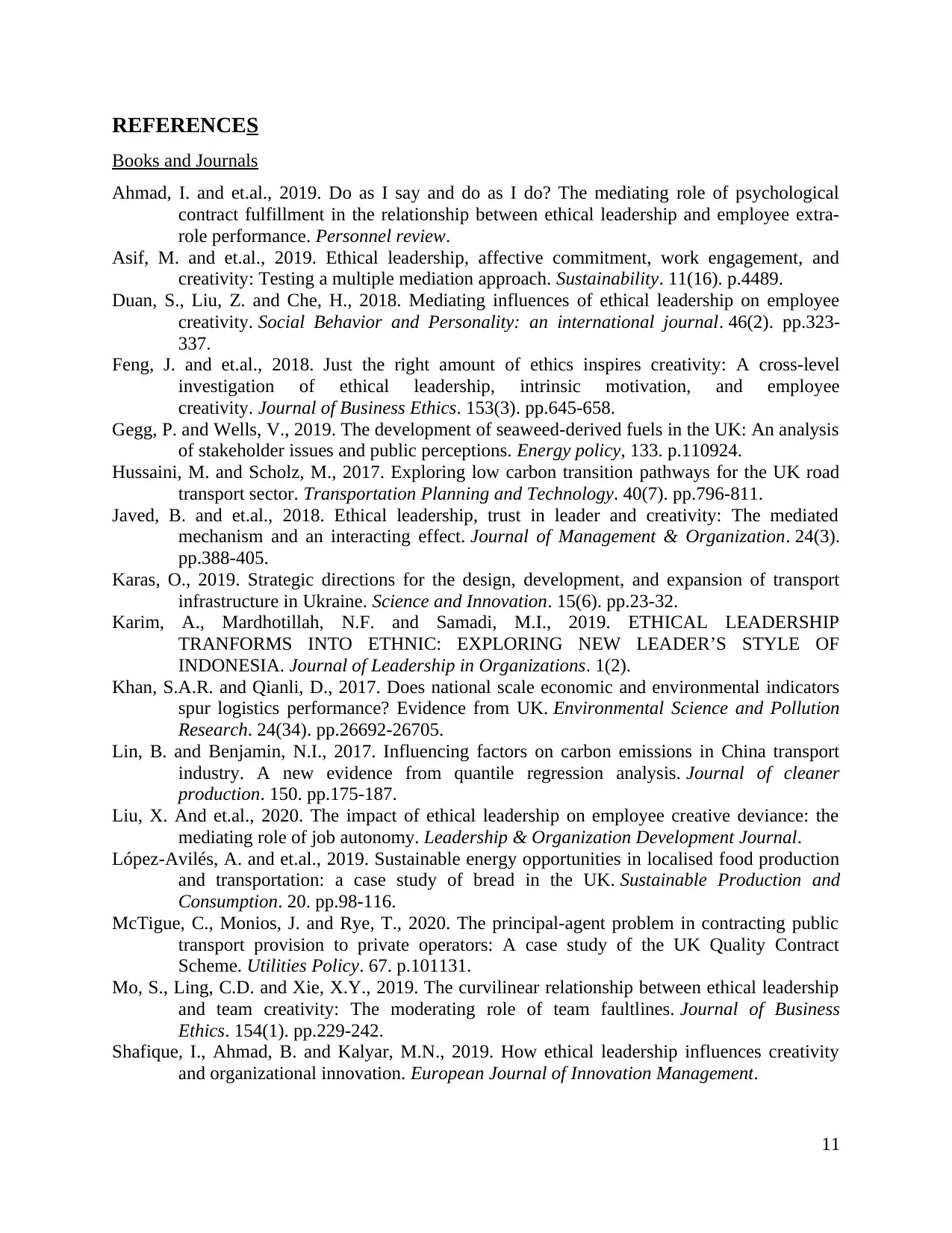
REFERENCES
Books and Journals
Ahmad, I. and et.al., 2019. Do as I say and do as I do? The mediating role of psychological
contract fulfillment in the relationship between ethical leadership and employee extra-
role performance. Personnel review.
Asif, M. and et.al., 2019. Ethical leadership, affective commitment, work engagement, and
creativity: Testing a multiple mediation approach. Sustainability. 11(16). p.4489.
Duan, S., Liu, Z. and Che, H., 2018. Mediating influences of ethical leadership on employee
creativity. Social Behavior and Personality: an international journal. 46(2). pp.323-
337.
Feng, J. and et.al., 2018. Just the right amount of ethics inspires creativity: A cross-level
investigation of ethical leadership, intrinsic motivation, and employee
creativity. Journal of Business Ethics. 153(3). pp.645-658.
Gegg, P. and Wells, V., 2019. The development of seaweed-derived fuels in the UK: An analysis
of stakeholder issues and public perceptions. Energy policy, 133. p.110924.
Hussaini, M. and Scholz, M., 2017. Exploring low carbon transition pathways for the UK road
transport sector. Transportation Planning and Technology. 40(7). pp.796-811.
Javed, B. and et.al., 2018. Ethical leadership, trust in leader and creativity: The mediated
mechanism and an interacting effect. Journal of Management & Organization. 24(3).
pp.388-405.
Karas, O., 2019. Strategic directions for the design, development, and expansion of transport
infrastructure in Ukraine. Science and Innovation. 15(6). pp.23-32.
Karim, A., Mardhotillah, N.F. and Samadi, M.I., 2019. ETHICAL LEADERSHIP
TRANFORMS INTO ETHNIC: EXPLORING NEW LEADER’S STYLE OF
INDONESIA. Journal of Leadership in Organizations. 1(2).
Khan, S.A.R. and Qianli, D., 2017. Does national scale economic and environmental indicators
spur logistics performance? Evidence from UK. Environmental Science and Pollution
Research. 24(34). pp.26692-26705.
Lin, B. and Benjamin, N.I., 2017. Influencing factors on carbon emissions in China transport
industry. A new evidence from quantile regression analysis. Journal of cleaner
production. 150. pp.175-187.
Liu, X. And et.al., 2020. The impact of ethical leadership on employee creative deviance: the
mediating role of job autonomy. Leadership & Organization Development Journal.
López-Avilés, A. and et.al., 2019. Sustainable energy opportunities in localised food production
and transportation: a case study of bread in the UK. Sustainable Production and
Consumption. 20. pp.98-116.
McTigue, C., Monios, J. and Rye, T., 2020. The principal-agent problem in contracting public
transport provision to private operators: A case study of the UK Quality Contract
Scheme. Utilities Policy. 67. p.101131.
Mo, S., Ling, C.D. and Xie, X.Y., 2019. The curvilinear relationship between ethical leadership
and team creativity: The moderating role of team faultlines. Journal of Business
Ethics. 154(1). pp.229-242.
Shafique, I., Ahmad, B. and Kalyar, M.N., 2019. How ethical leadership influences creativity
and organizational innovation. European Journal of Innovation Management.
11
Books and Journals
Ahmad, I. and et.al., 2019. Do as I say and do as I do? The mediating role of psychological
contract fulfillment in the relationship between ethical leadership and employee extra-
role performance. Personnel review.
Asif, M. and et.al., 2019. Ethical leadership, affective commitment, work engagement, and
creativity: Testing a multiple mediation approach. Sustainability. 11(16). p.4489.
Duan, S., Liu, Z. and Che, H., 2018. Mediating influences of ethical leadership on employee
creativity. Social Behavior and Personality: an international journal. 46(2). pp.323-
337.
Feng, J. and et.al., 2018. Just the right amount of ethics inspires creativity: A cross-level
investigation of ethical leadership, intrinsic motivation, and employee
creativity. Journal of Business Ethics. 153(3). pp.645-658.
Gegg, P. and Wells, V., 2019. The development of seaweed-derived fuels in the UK: An analysis
of stakeholder issues and public perceptions. Energy policy, 133. p.110924.
Hussaini, M. and Scholz, M., 2017. Exploring low carbon transition pathways for the UK road
transport sector. Transportation Planning and Technology. 40(7). pp.796-811.
Javed, B. and et.al., 2018. Ethical leadership, trust in leader and creativity: The mediated
mechanism and an interacting effect. Journal of Management & Organization. 24(3).
pp.388-405.
Karas, O., 2019. Strategic directions for the design, development, and expansion of transport
infrastructure in Ukraine. Science and Innovation. 15(6). pp.23-32.
Karim, A., Mardhotillah, N.F. and Samadi, M.I., 2019. ETHICAL LEADERSHIP
TRANFORMS INTO ETHNIC: EXPLORING NEW LEADER’S STYLE OF
INDONESIA. Journal of Leadership in Organizations. 1(2).
Khan, S.A.R. and Qianli, D., 2017. Does national scale economic and environmental indicators
spur logistics performance? Evidence from UK. Environmental Science and Pollution
Research. 24(34). pp.26692-26705.
Lin, B. and Benjamin, N.I., 2017. Influencing factors on carbon emissions in China transport
industry. A new evidence from quantile regression analysis. Journal of cleaner
production. 150. pp.175-187.
Liu, X. And et.al., 2020. The impact of ethical leadership on employee creative deviance: the
mediating role of job autonomy. Leadership & Organization Development Journal.
López-Avilés, A. and et.al., 2019. Sustainable energy opportunities in localised food production
and transportation: a case study of bread in the UK. Sustainable Production and
Consumption. 20. pp.98-116.
McTigue, C., Monios, J. and Rye, T., 2020. The principal-agent problem in contracting public
transport provision to private operators: A case study of the UK Quality Contract
Scheme. Utilities Policy. 67. p.101131.
Mo, S., Ling, C.D. and Xie, X.Y., 2019. The curvilinear relationship between ethical leadership
and team creativity: The moderating role of team faultlines. Journal of Business
Ethics. 154(1). pp.229-242.
Shafique, I., Ahmad, B. and Kalyar, M.N., 2019. How ethical leadership influences creativity
and organizational innovation. European Journal of Innovation Management.
11
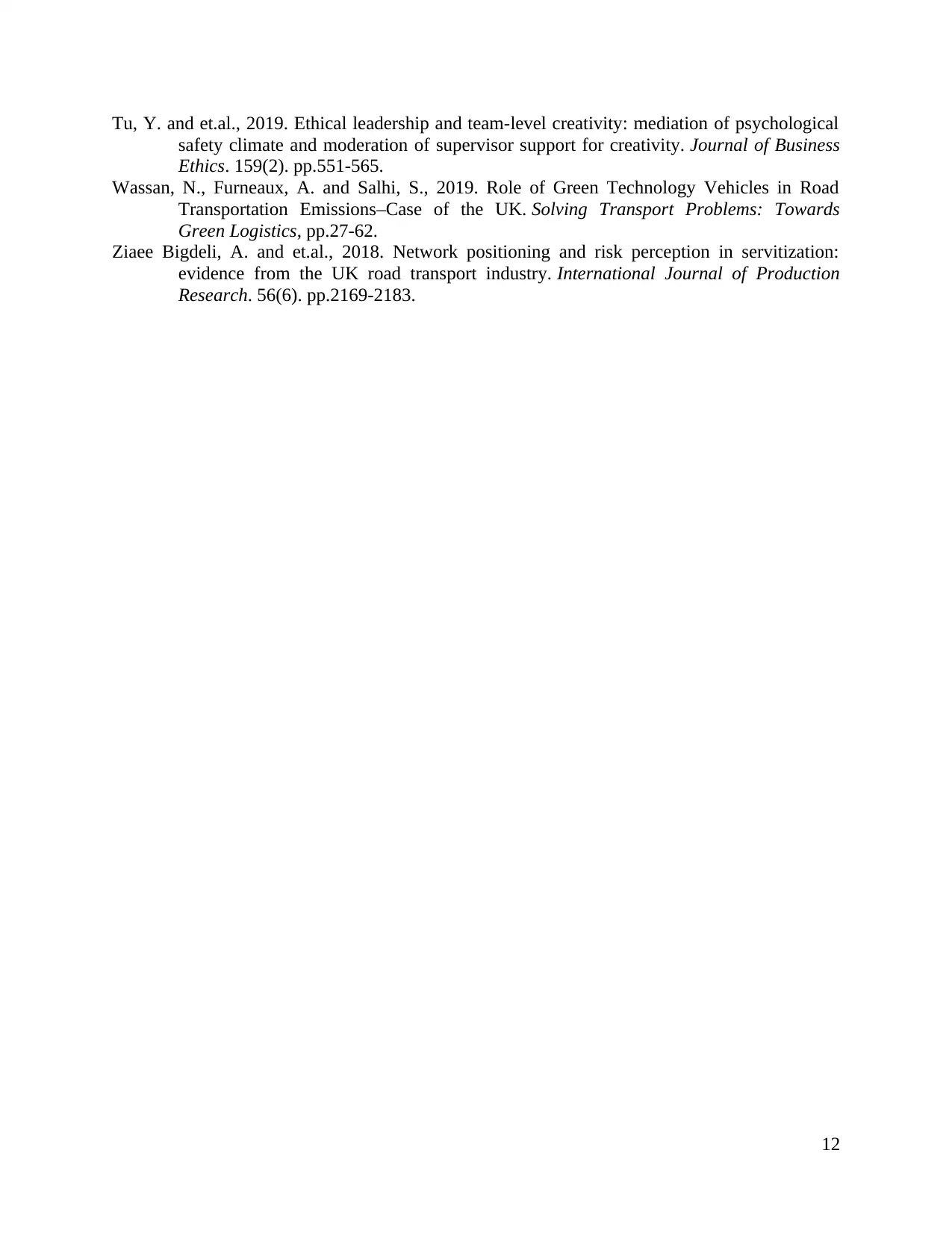
Tu, Y. and et.al., 2019. Ethical leadership and team-level creativity: mediation of psychological
safety climate and moderation of supervisor support for creativity. Journal of Business
Ethics. 159(2). pp.551-565.
Wassan, N., Furneaux, A. and Salhi, S., 2019. Role of Green Technology Vehicles in Road
Transportation Emissions–Case of the UK. Solving Transport Problems: Towards
Green Logistics, pp.27-62.
Ziaee Bigdeli, A. and et.al., 2018. Network positioning and risk perception in servitization:
evidence from the UK road transport industry. International Journal of Production
Research. 56(6). pp.2169-2183.
12
safety climate and moderation of supervisor support for creativity. Journal of Business
Ethics. 159(2). pp.551-565.
Wassan, N., Furneaux, A. and Salhi, S., 2019. Role of Green Technology Vehicles in Road
Transportation Emissions–Case of the UK. Solving Transport Problems: Towards
Green Logistics, pp.27-62.
Ziaee Bigdeli, A. and et.al., 2018. Network positioning and risk perception in servitization:
evidence from the UK road transport industry. International Journal of Production
Research. 56(6). pp.2169-2183.
12
⊘ This is a preview!⊘
Do you want full access?
Subscribe today to unlock all pages.

Trusted by 1+ million students worldwide
1 out of 12
Related Documents
Your All-in-One AI-Powered Toolkit for Academic Success.
+13062052269
info@desklib.com
Available 24*7 on WhatsApp / Email
![[object Object]](/_next/static/media/star-bottom.7253800d.svg)
Unlock your academic potential
Copyright © 2020–2026 A2Z Services. All Rights Reserved. Developed and managed by ZUCOL.





